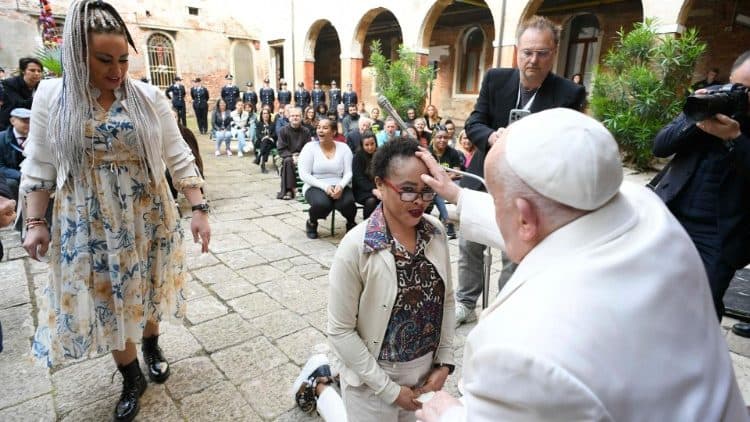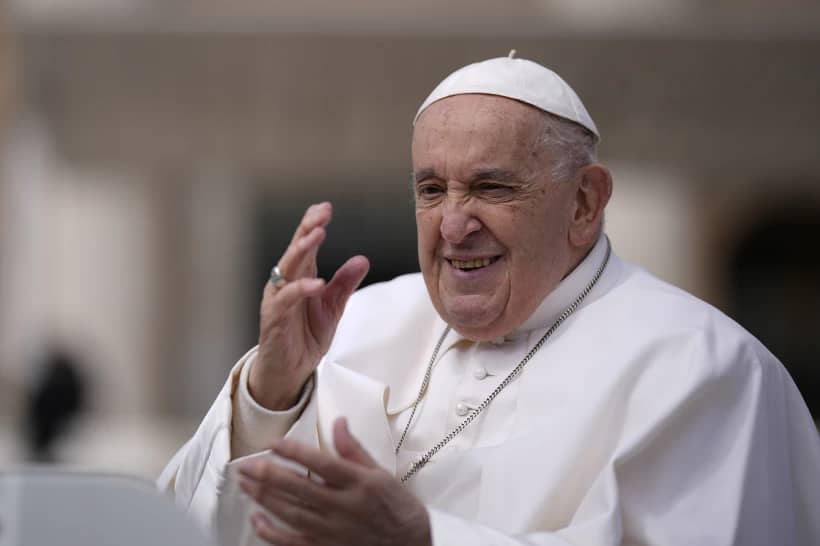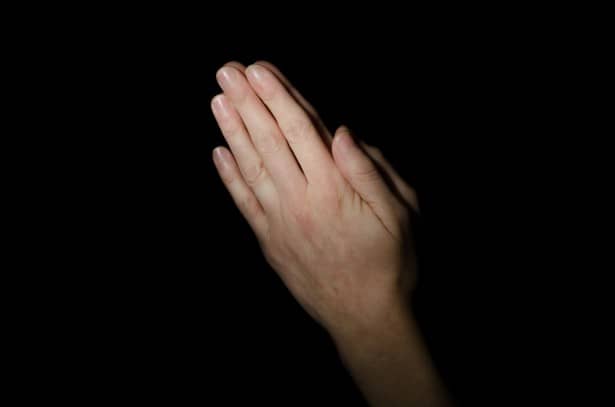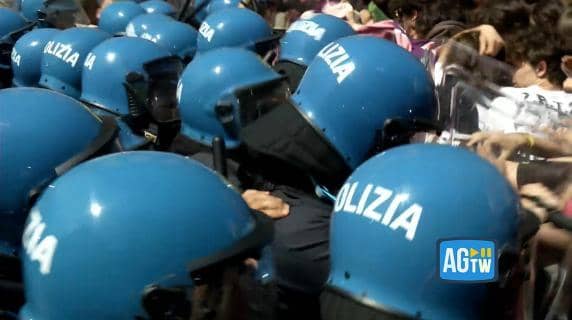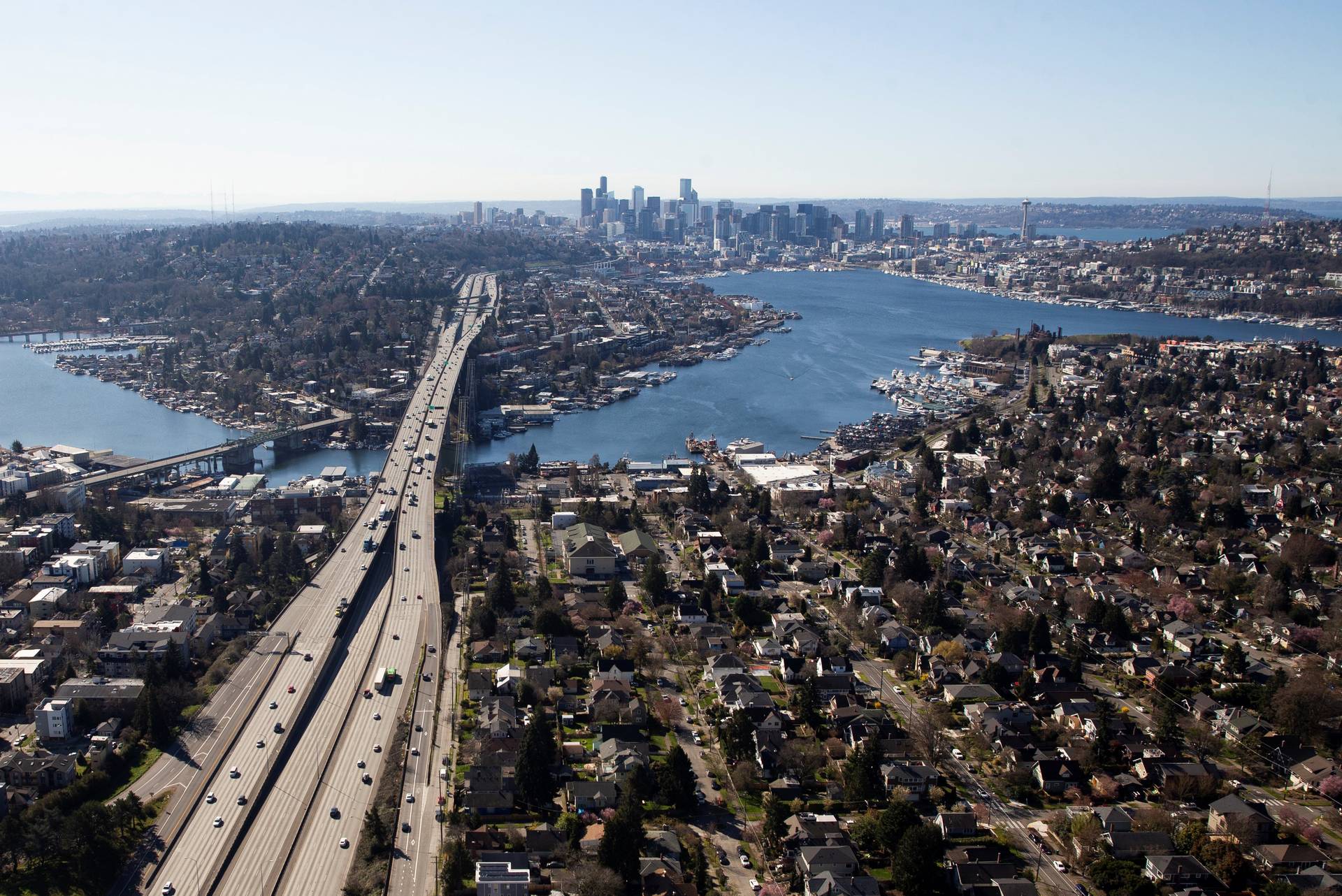ROME – Pope Francis made a day trip to Venice Sunday to attend a famed annual cultural event, meeting prisoners, artists and young people, stressing the role that art can play in shaping culture for the better and the importance of maintaining joy and hope amid the vicissitudes of life.
Despite recent health challenges for the 87-year-old pontiff, Francis appeared engaged and energetic throughout his itinerary. He arrived from Rome by helicopter and later boarded one of Venice’s famed motoscafi, or waterborne taxis, to reach his meeting with youths. Throughout the day, Francis used a wheelchair to make his way to and from public appointments.
Speaking to 80 inmates at a women’s prison on the island of Giudecca, the pope said that “each of us, here, today, has something unique to give and to receive,” and that he himself would likely be the most enriched by the encounter.
He pointed to common problems in prisons, such as overcrowding, violence, and a lack of resources, but noted that despite the suffering these things generate, prisons can also become places “of moral and material rebirth.”
They can be places, he said, “where the dignity of women and men is not ‘placed in isolation’, but promoted through mutual respect and the nurturing of talents and abilities, perhaps dormant or imprisoned, but which can re-emerge for the good of all and which deserve attention and trust.”
“Paradoxically, a stay in prison can mark the beginning of something new, through the rediscovery of the unsuspected beauty in us and in others,” he said, saying a prison can become “a building site for reconstruction” that offers a new perspective on one’s life, and the ability to lay a new foundation.
Pope Francis traveled to Venice Saturday for the city’s annual “Biennale” festival, which featured various works of art, architecture, cinema, dance, music, theater and more. It marked the first time a pope has ever attended the Biennale, which began in 1895 and is one of the largest annual cultural events in Europe.
As part of his day trip, Francis also met with artists participating in the Biennale inside the prison chapel, and he held a meeting with young people in front of Venice’s Basilica of Santa Maria della Salute.
He closed his visit with Mass in the square in front of the city’s famed Basilica of Saint Mark, where the remains of Mark the Evangelist, author of one of the four Gospels, are buried.
Francesco Moraglia, Patriarch of Venice, accompanied the pope throughout his visit.
In his brief speech to artists, the pope said the world needed them, and highlighted the role of art as a tool of inclusion opposed to various forms of violence and discrimination.
Art itself, he said, is “a city of refuge, a city that disobeys the regime of violence and discrimination in order to create forms of human belonging capable of recognizing, including, protecting and embracing everyone. Everyone, starting from the last.”
“It would be important if the various artistic practices could establish themselves everywhere as a sort of network of cities of refuge, cooperating to rid the world of the senseless and by now empty oppositions that seek to gain ground in racism, in xenophobia, in inequality, in ecological imbalance and aporophobia, that terrible neologism that means ‘phobia of the poor,’” he said.
Behind each of these attitudes, he said, is a “refusal of the other” and a selfishness that leads people to become isolated, pursuing individual interests.
He closed pointing to several female artists whose work he said has something to teach humanity, such as Frida Khalo, Corita Kent and Louise Bourgeois.
“I hope with all my heart that contemporary art can open our eyes, helping us to value adequately the contribution of women, as co-protagonists of the human adventure,” he said.
In his meeting with 1,500 young people, Pope Francis told them they were made for heaven, and that they must “rise to stand in front of life, not to sit on the couch.”
“Get out of bed and accept yourself as a gift…Remember that for God, you are not a digital profile, but a child, that you have a Father in heaven and therefore you are a child of heaven,” he said, saying the must let themselves be picked up in a world that often wants to pull them down.
Francis noted that God worked wonders with the weakness of many characters in the bible, and that despite whatever feelings of inadequacy they might have, young people can be encouraged by this, because for God, beauty and fragility often go together.
“He is our Father and, when we are down, he sees children to lift up, not evildoers to punish. Trust in him!” he said, telling young people to keep standing “when we feel like sitting down, letting go, or giving up. It is not easy, but this is the secret.”
“Take life into your hands, get involved; turn off the TV and open the Gospel; leave the cell phone and encounter people!” he said, saying they could keep the cell phone, but only if they made a point of encountering those around them.
Rather, he told them to be “creators of new things! Be creative with gratuitousness; bring to life a symphony of gratuitousness in a world that seeks profit! Then you will be revolutionaries.”
Francis closed his visit to Venice with Mass in Saint Mark’s Square, during which he reflected on the role of Christians in fighting global challenges through the pursuit of solidarity, justice, and genuine community, with no one excluded.
He took his cue from the biblical passage from the day’s Gospel reading, “Whoever remains in me and I in him will bear much fruit.”
“While the metaphor of the vine expresses God’s loving care for us, it also warns us that if we sever this connection with the Lord, we cannot produce fruits of good life and risk becoming dry branches, which will be cast aside,” he said.
What matters, the pope said, is to “remain in the Lord,” which he said is not a passive or static attitude, but is rather an invitation “to move” and to enter into conversation with God and with scripture, and to follow Jesus “on the path of the Kingdom of God.”
Alluding to the image of the vine and branches, Pope Francis said the fruit of joy and hope that comes from God is what believers are called to bear in their daily lives, even in the face of challenges.
He pointed to issues of local concern in Venice such as climate change, the weaking of the construction of the “floating city,” and an inadequate management of tourism amid an overwhelming influx, among other things.
“All that these realities risk generating in terms of frayed social relations, individualism, and loneliness,” he said, saying Christians can help combat these things by bringing “the fruits of the Gospel into the reality we inhabit.”
“We need our Christian communities, neighborhoods, and cities to become welcoming, inclusive, and hospitable places,” he said, saying, “Venice, which has always been a place of encounter and cultural exchange, is called to be a sign of beauty available to all, starting with the last, a sign of fraternity and care for our common home.”
